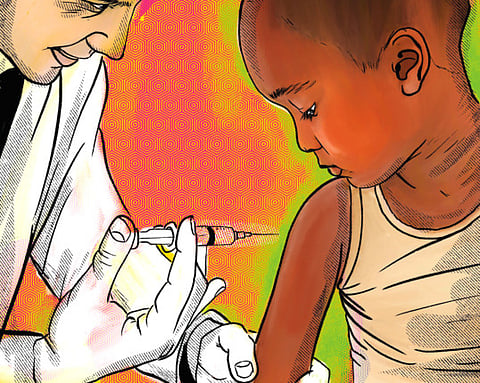How mankind can triumph over disease
Gene-editing technologies that alter mosquitoes’ DNA could prove critical in the fight against malaria

Since I started my second career as a philanthropist almost 20 years ago, I have seen more suffering than I ever expected. One of the worst things I have ever seen, years ago in Tanzania, is a child having seizures from cerebral malaria. I didn’t know if he would survive. I did know that, even if he did, his brain development would be impaired.
The fact that the world has saved millions of children from that kind of suffering is a great achievement. It’s a testament to our collective persistence and ambition. I don’t use superlatives lightly. But progress against malaria has been one of the most impressive successes in global health in this generation.
In 1999, almost one million people died of malaria. Since then, malaria funding has increased tenfold. This increase has financed highly effective drug treatments, rapid diagnostic tests, long-lasting indoor insecticide sprays, and insecticide-treated bed nets. Such innovations have saved almost seven million lives and eliminated malaria in 18 countries. Half the world is now malaria-free.
Much of this progress has been thanks to the strength of British scientific innovation. More than a century after Sir Ronald Ross discovered that mosquitoes transmit the malaria parasite, R&D is still giving us the tools we need to defeat malaria. It has put us on the path to end malaria for good — helping to build a safer, more secure and more prosperous world for all of us.
But a child still dies from malaria every two minutes, every day. More than 200 million people still suffer from the disease every year. And in 2016, for the first time in years, the number of malaria cases in the world went up. This is not a blip. It is not noise. It is a signal. Malaria is fighting back.
Much of our current effort is going towards replacing worn-out nets and re-spraying houses, which means that we are using a significant proportion of the money and effort we have just to keep up. The nets, sprays, and drugs also aren’t working as well as they used to. Resistance to the insecticides that drove numbers of cases and deaths down is now widespread. We are also seeing pockets of resistance to the most important drug combinations we use to treat malaria. And human migration is continually importing the disease from high burden to lower burden areas. In short, we have reached the point of diminishing returns from our current strategy.
Commonwealth countries and their leaders are on the front line in the fight against malaria, with 90 per cent of Commonwealth citizens living in malaria-affected countries. This week, Commonwealth leaders in London can write the next chapter in the story of our fight against malaria by taking up the ambitious goal of halving the burden in five years, saving 650,000 lives and preventing 350 million cases. It will take new funding, high-quality data to track progress, better disease surveillance to identify malaria outbreaks, and innovation to develop the new tools we need to fight a disease that is trying to outsmart us.
The good news is that, unlike 15 years ago, when we were emerging from decades of stagnation, innovation is already producing results in prevention, detection, and treatment. And British scientists are leading the way.
First, on prevention, the IVCC in Liverpool has partnered with crop protection companies to develop new insecticides. Secondly, on detection, highly sensitive rapid diagnostics can detect malaria in people who aren’t sick and don’t know they are harbouring the parasite. Thirdly, on treatment, GSK, the British pharmaceutical company, is developing a single-dose regimen to cure people who have the relapsing form of the disease.
Thanks to new drugs developed through the Medicines for Malaria Venture, we also have more options for managing severe cases. And, for the first time, we now have an approved malaria vaccine, also developed by GSK, to be introduced later this year.
I’m particularly excited about the potential of gene drive, a method of mosquito control that can make mosquitoes infertile or prevent them from carrying the malaria parasite. Leaders of more than a dozen malaria-affected Commonwealth countries are making substantial pledges to fight the disease in their own countries.
The private sector is stepping up, too. And my own foundation will commit an additional £700 million (Dh3.66 trillion) — including a £50 million contribution partly to match the United Kingdom’s new commitment to the Global Fund — to the fight against malaria over the next five years. In total today, the global community will commit over £2.7 billion of funding and accelerated innovation to save lives and put us on the path to ending malaria forever.
These ambitious commitments are evidence of the power, influence and optimism of the Commonwealth. Together with the application of new and innovative science, we are moving one step closer to a day when no child will go through what I saw in that hospital in Tanzania ever again.
— The Telegraph Group Limited, London, 2018
Bill Gates is a philanthropist, humanitarian, and founder of Microsoft Corporation.


